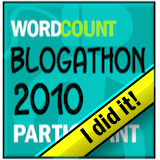"Financial blogging has it's challenges", said the copywriter.
If you identified the errors in the sentence above, you probably aren't making bloggers' two most common punctuation mistakes. These mistakes aren't confined to blogs. I see them in every kind of financial and personal communication.
It's vs. its
"It's" is a whopping exception to the rule that you form the possessive by adding an apostrophe and the letter s.
"The performance of the mutual fund" becomes "the mutual fund's performance," but "the performance of it" becomes "its performance," with no apostrophe.
"Apostrophes should not be used with possessive pronouns because possessive pronouns already show possession," as explained by the Online Writing Center at Purdue University. So don't add an apostrophe to "yours," "ours," "his," "hers," or "theirs."
Remember: "it's" always means "it is."
Quotation marks and misplaced punctuation
Punctuation generally belongs inside the closing quotation mark. So my opening sentence should be punctuated like this: "Financial blogging has its challenges," said the copywriter.
The Associated Press Stylebook puts the rules like this:
1. "The period and the comma always go within the quotation marks."
2. "The dash, the semicolon, the question mark and the exclamation point go within the quotation marks when they apply to the quoted matter only. They go outside when they apply to the whole sentence."
The Stylebook is talking about punctuation at the end, not the beginning, of a quotation.
However, if you're writing for a British or Canadian audience rather than a U.S. audience, punctuation goes outside the quotation marks. Grammar Girl says, "Printers found that the periods and commas were more stable when they were placed inside closing quotation marks, so that's the way they started doing it," according to "Why are British English and American English different?" Grammar Girl seems to agree with my friend who thinks the British practice is more logical. Still, punctuation-conscious Americans wince when you flout the American way.
The bottom line
Earlier this year I asked my newsletter readers "Do grammar or punctuation errors affect the writer's credibility in your eyes?"
Results:
0% No, I don't notice errors
2% No, I don't care
22% Yes, but I forgive small errors, especially in social networking posts
75% Yes, it generally hurts my opinion
Only 2% of respondents answered "No." That sends a strong message about the impact that errors have on your readers.
So, please
* Distinguish between "it's" and "its."
* Always put your commas and periods inside your closing quotation marks.
Do you have a question about these punctuation practices? Ask it in the Comments below.
---------------------------
Susan B. Weiner, CFA
Check out my website at www.InvestmentWriting.com or sign up for my free monthly e-newsletter.
Copyright 2009 by Susan B. Weiner All rights reserved
Wednesday, July 15, 2009
Bloggers' top two punctuation mistakes
Labels:
blog,
communication,
investment commentary,
punctuation,
writing
Subscribe to:
Post Comments (Atom)



That's a really useful post. Grammar is a real bugbear of mine, so thanks!
ReplyDeleteNick,
ReplyDeleteI'm glad I could help!
And what is the rule about punctuation and parentheses? For example, when a sentence begins outside parens and includes a parenthetical phrase at the end. Does the period go inside or outside?
ReplyDeleteOutside.
ReplyDeleteAs the AP Style Guide says, "Place a period outside a closing parenthesis if the material inside is not a sentence."
Thanks to Grammar Girl for pointing me to this song about it's vs. its: http://www.thefump.com/fump.php?id=1205
ReplyDelete